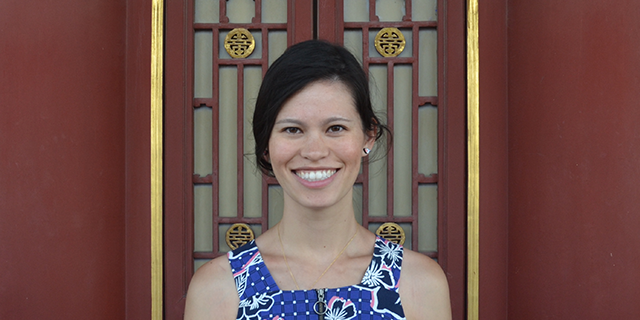Speech Pathology: Jess Boyce
Dr Jessica Boyce is a lecturer in the Master of Speech Pathology at the University of Melbourne, and Co-Director of Protea Therapy, a paediatric private practice.

Tell me about your current role and your professional and educational background? How long have you worked in your current role?
I currently have two (main) professional hats: lecturer and speech pathologist. I also maintain research links with the Murdoch Children’s Research Institute (MCRI). I have been in these roles for the last 4-5 years. It has been wonderful to return to the University of Melbourne as a lecturer after working clinically for several years before completing my PhD; even more so having completed my own speech pathology training through this course! Clinically, I specialise in speech and literacy, particularly cleft speech, and early speech and literacy skills.
I have previously worked in a number of different settings:
- Community Health, in the paediatric team and coordinating the Koolin Balit Children's Clinic (KBCC). In the KBCC, I coordinated and worked within a multi-disciplinary team that provided health assessments to Aboriginal and Torres Strait Islander children in out-of-home-care.
- Royal Children’s Hospital (RCH), in the Cleft Clinic and other communication clinics, including Pathways to Good Health.
- Private practice, while working in public health and completing my PhD, I also worked privately, providing a broad range of speech pathology services to children of all ages and with a range of difficulties.
I have a Bachelor of Arts, Master of Speech Pathology and PhD through the University of Melbourne and the MCRI. My PhD explored the speech and language phenotyping for individuals with a cleft of the lip and/or palate.
How did you go about finding your jobs? What techniques, websites, contacts, networks did you use to get your job?
I started working at cohealth after completing my Masters degree. At this time, I found the role advertised on seek.com, interviewed and commenced working as a speech pathologist. When I started my PhD, I expressed a desire to maintain clinical work within the organisation where possible - the opportunity to work within the KBCC came up and I took it.
At the Royal Children's Hospital I was interviewed for an advertised position. I had also established links with the RCH speech pathology team through my PhD research at MCRI.
For my early work in private practice, I met my then manager at a Victorian speech pathology ‘Bilingualism Interest Group’. Through discussions after the meeting, we identified common skillsets (including the fact that I can speak Chinese). I then started working at her practice. After building experience over time and through my research, I was confident to start up my own practice with a colleague: Protea Therapy.
After graduating from my Masters degree, I maintained relationships with my thesis supervisors and they contacted me when a PhD opportunity arose.
What do you like most about working at your organisation?
I enjoy the variation I get across my roles. A lot of this comes with who I am surrounded by in my work, both clients and colleagues. My clinical work provides the opportunity to work with children and families and keep grounded in applying what I teach. The University of Melbourne and MCRI provide rich environments for continuous critical engagement and reflection, while we extend our knowledge base and train future generations of speech pathologists.
What is one thing you wish you knew before you started your professional career?
There will always be new jobs, opportunities and networks. If you don't get a job - or your ideal job - right away, keep your eyes open and continue seeking opportunities for growth and development. You have time.
What is one piece of advice you would give to students who are graduating soon and are looking to work in Speech Pathology?
Find your point of difference, something personal that goes beyond learned theory and academic ability. In this helping profession, your personality has more of an impact than you think.